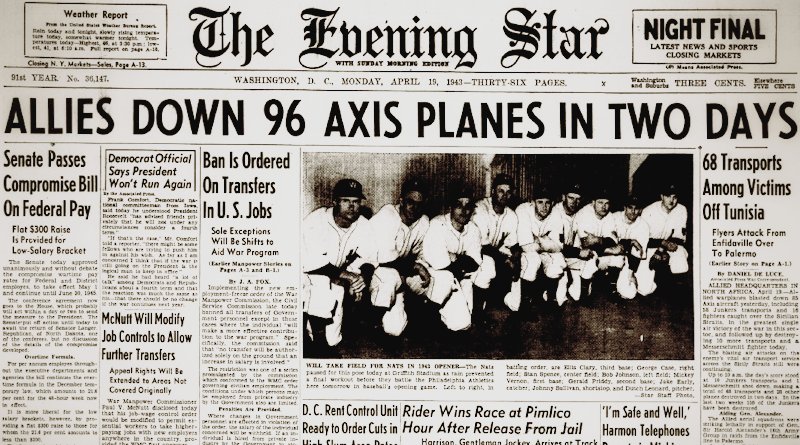World War II Chronicle: April 19, 1943
Click here for TODAY’S NEWSPAPER
The front page reports that Heisman Trophy winner Tom Harmon has made it back after spending four days wandering the jungles of Dutch Guiana after a thunderstorm caused his bomber to crash during a ferry flight to Brazil. Harmon managed to bail out of his B-25’s escape hatch, but the rest of his crew wasn’t as lucky. Walt Disney designed the nose art for Harmon’s bomber, which was named Little Butch, after Harmon’s actress girlfriend Elyse “Butch” Knox…

Cincinnati Reds pitcher Johnny Vander Meer has been classified 1-A by the draft board. He has led the National League in strikeouts the past two seasons… Meanwhile, Allied fighters have shot down dozens of German transports enroute to Sicily. Axis forces have had a heck of a time getting supplies shipped across the Mediterranean; Half of their supplies are sunk before reaching Africa which forced them to rely heavily on air transport. Unfortunately for them the Allies have gained air superiority and have also learned the German routes and schedule. They have hit the Luftwaffe so hard that Hermann Göring will order all transport operations to be flown at night. It is too little, too late…
Page seven reports that when Jack Mathis was killed on a bombing raid, brother Rhude Mark Mathis took over his seat on the B-17. Stay tuned for more… George Fielding Eliot column on page eight… Sports section begins on page 12… “Torpedo 8” continues on page 29.
Roving Reporter by Ernie Pyle
IN TUNISIA — Little cameos —
Late one night I was bedding down as a transient visitor in a front-line American hospital. Just before bedtime a soldier came past and introduced himself, and asked if I would like some fruitcake. I didn’t especially care for any fruitcake, but up here you never refuse anything so I went along with him and ate three piece of fruitcake and half a pound of chocolate candy before going to bed.
The soldier was Corp. Lester Gray, of Chicago. He has been married two years. The fruitcake we ate was made by his wife. It was, incidentally, the first one she ever made. Her success with it apparently went to her head, for Corporal Gray said five more like it were on the way.
Gray is a laboratory technician with the hospital. Before the war he was a salesman for a wholesale jewelry concern. Ever since he has been in Africa he has kept a steady flow of letters going back home to every one of his old customers. How’s that for salesmanship?
One day in an olive grove where some troops were camped I saw a beautiful German shepherd nosing around.
It turned out the soldiers had brought her all the way from America. Soldiers over here have picked up literally thousands and thousands of dogs as pets, but this is the first one I’ve heard of that came all the way from home.
She originally belonged to Sgt. Edward Moody of Minneapolis, who was killed in an accident. After his death the whole battery adopted her as a mascot. She has been on two long convoy trips, has served in Ireland and England, and been in several battles on the Tunisian front. She had eight pups on the way down from England.
Her name is “Lady.” She was only three weeks old when the soldiers got her, so her entire life has been spent with men in uniform. She is suspicious of civilians and a person in civilian clothes cannot make up to her.
Despite her martial career, “Lady” is afraid of gunfire. She gets the trembles when the big guns begin to thunder. Eventually they hope she’ll get over it and go charging right along with them into battle.
Another night I was eating dinner with eight Air Force officers in the little hotel at Feriana. At the only other table in the dining room were a bunch of French officers.
We ate and made a lot of noise, and they ate and made a lot of noise, and neither table paid any attention to the other.
Then when we were about through, some of the Americans started singing. I will have to say they were probably the worst singers I’ve ever heard. They were so bad they finally just sort of bogged down, and we all laughed at ourselves in confusion.
Seeing that, the French raised their glasses to us in toast — a tribute for a good try, I suppose. Then we toasted back, and they stood up, and we stood up, and we toasted each other back and forth till everybody was embarrassed. And finally the French relieved the tension by saying they’d like to sing a song for us.
And could they sing? It was like a professional glee club. Three of them were wounded veterans of the last war, covered with medals. One looked like an escape from Devil’s Island. One was a chaplain, and he was just a youth, but had a ferocious long beard and a bass voice like Singin’ Sam of the radio.
Those Frenchmen sang for an hour. Not ordinary songs that you’d heard before, but fighting regimental songs and catchy tunes with an almost jungle-like rhythm. The coal-oil lamp threw shadows on their faces, and it was truly an Old World scene out of a book.
The touching part was just at the last, when the officer who looked like Devil’s Island came over and told us what the dinner was for.
Their outfit had gone into the lines two weeks before. Today they had come out. Tonight those who survived were having a reunion, eating and drinking and singing for the ones who did not come back. Twenty-five had gone into the lines. Eleven were at the dinner.
Evening star. (Washington, D.C.), 19 April 1943. Chronicling America: Historic American Newspapers. Lib. of Congress.
https://chroniclingamerica.loc.gov/lccn/sn83045462/1943-04-19/ed-1/
